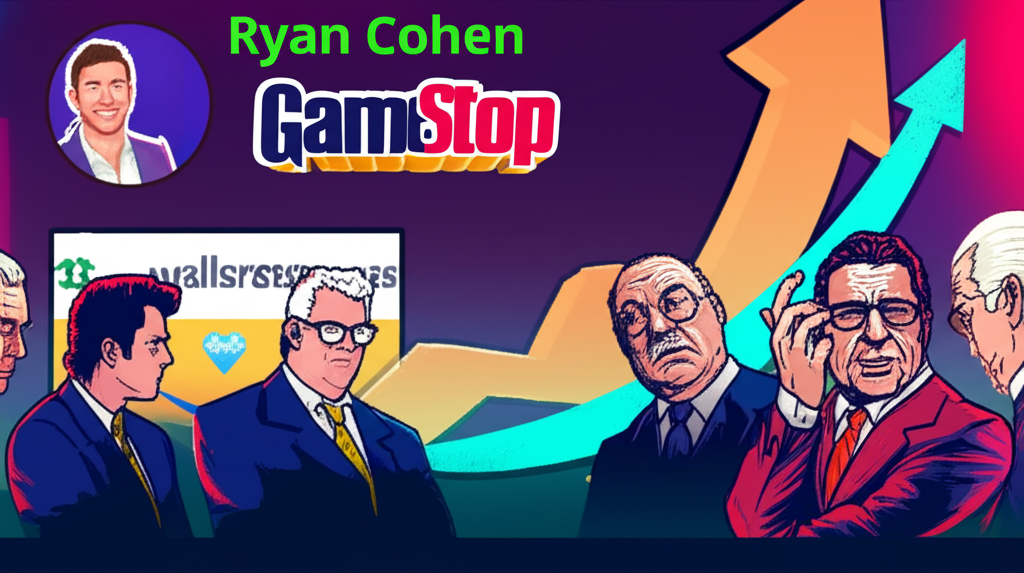Introduction: Who is Ryan Cohen, the “Meme King”?

Ryan Cohen has emerged as one of the most controversial and transformative figures in modern finance, widely celebrated—and sometimes criticized—as the “Meme King.” From launching a billion-dollar e-commerce empire to reshaping the dynamics of retail investing, Cohen’s influence extends far beyond stock charts. His involvement in the GameStop (GME) saga didn’t just move markets; it ignited a cultural revolution that challenged the long-standing dominance of institutional investors. By blending activist investing with digital charisma, Cohen galvanized a decentralized army of retail traders, redefining how power can be wielded in financial markets. This article explores his journey from entrepreneur to market disruptor, analyzes the mechanics of the GameStop phenomenon, and examines the broader implications of his rise—both for individual investors and the future of finance.
The Genesis of a Legend: From Chewy Founder to Activist Investor

Long before he became a symbol of retail investor empowerment, Ryan Cohen had already proven himself a master of digital disruption. His success wasn’t built on hype or speculation, but on a deep understanding of consumer behavior and the growing power of online retail. As a young entrepreneur, he identified a gap in the market—pet owners who wanted convenience, reliability, and exceptional service when buying pet food and supplies online. That insight became the foundation of Chewy, a company that would not only thrive in the e-commerce space but also set a new standard for customer-centric business models.
Chewy’s Success: Building an E-commerce Powerhouse
Founded in 2011 alongside co-founder Leonardo Levis, Chewy quickly distinguished itself through relentless focus on customer experience. Unlike traditional retailers, Chewy offered personalized service, 24/7 customer support, fast shipping, and even hand-written thank-you notes with deliveries—practices that fostered intense brand loyalty. The company also invested heavily in logistics and technology to ensure scalability, allowing it to compete with giants like Amazon in the pet niche. By 2017, Chewy’s growth attracted PetSmart, which acquired the company for $3.35 billion in a landmark deal that underscored the value of direct-to-consumer digital brands. Chewy later went public in 2019, reaching a market valuation exceeding $10 billion, further cementing Cohen’s reputation as a visionary in the tech and retail sectors. His success with Chewy demonstrated a repeatable formula: identify an underserved market, leverage digital infrastructure, and prioritize the customer above all else. For more on Chewy’s rise, see CNBC’s coverage of the PetSmart acquisition.
GameStop’s Plight: A Company Ripe for Disruption
While Chewy represented the future of retail, GameStop symbolized its troubled past. Once a dominant force in video game culture, the company struggled throughout the 2010s as digital downloads, streaming platforms, and online marketplaces eroded the relevance of physical game sales. Its brick-and-mortar stores, once bustling with teenage gamers, faced declining foot traffic and shrinking margins. Wall Street took notice, and by 2020, GameStop had become one of the most heavily shorted stocks on the market, with hedge funds betting billions on its eventual collapse. To many, it appeared to be a textbook case of corporate obsolescence. But to Ryan Cohen, it looked like an opportunity—a brand with deep cultural resonance that could be revitalized through digital transformation. With firsthand experience turning Chewy into an e-commerce leader, he saw parallels and potential. The question wasn’t whether GameStop could survive, but whether it could evolve.
The GameStop Saga: How Ryan Cohen Ignited the Meme Stock Phenomenon

What began as a strategic activist investment quickly escalated into a full-blown financial and cultural uprising. Ryan Cohen didn’t just invest in GameStop—he reimagined its future and broadcast that vision to a generation of investors who had long felt excluded from Wall Street’s inner circles. His actions didn’t occur in a vacuum; they intersected with a growing sense of frustration among retail traders, the rise of commission-free trading platforms, and the viral energy of online communities. The result was the GameStop short squeeze of early 2021, a moment that stunned financial markets and redefined the power dynamics between institutional and individual investors.
Initial Investment and Activist Stance
Cohen’s formal involvement with GameStop began in August 2020, when his investment firm, RC Ventures, disclosed a 12.9% stake in the company—making it one of the largest shareholders. This wasn’t a passive bet; it was the opening move in a calculated campaign to overhaul GameStop’s business model. In a letter to the board in November 2020, Cohen laid out a clear vision: pivot aggressively toward e-commerce, modernize the digital platform, and transform the company into a tech-driven retailer. He criticized the board for moving too slowly and failing to capitalize on the brand’s potential. His pressure paid off. In January 2021, GameStop announced a major board restructuring, appointing Cohen and two of his associates—Alan Attal and Dan DeWitt—to key positions. By June 2021, Cohen had assumed the role of Chairman, giving him direct influence over the company’s strategic direction. This shift signaled more than a change in leadership; it represented a fundamental challenge to corporate inertia and outdated retail models.
The Power of Social Media: Cryptic Tweets and Retail Rallies
What set Cohen apart from traditional activist investors was his use of social media as a strategic tool. While most financiers communicate through formal filings or press releases, Cohen leveraged Twitter to speak directly to the public—often in ways that were subtle, symbolic, and open to interpretation. A single emoji, a mysterious image, or a brief comment could send shockwaves through online trading communities. For instance, a tweet showing an ice cream cone was widely interpreted as a nod to a “melting” short position—slang for a rapid price surge that forces short sellers to cover their bets. Similarly, a photo of a frog—long associated with the “stonks” meme—sparked speculation about GameStop’s future direction. These posts weren’t explicit endorsements, but they functioned as digital breadcrumbs, guiding retail investors toward collective action. In doing so, Cohen mastered a new form of market influence—one that operated outside traditional channels and harnessed the viral nature of internet culture.
The “Diamond Hands” Movement and Wall Street Bets
Cohen’s influence found its most potent expression in online forums like Reddit’s r/wallstreetbets, a community known for high-risk trades, dark humor, and a deep skepticism of Wall Street. Here, Cohen was hailed not just as an investor, but as a folk hero—a billionaire who seemed to be on the side of the little guy. The “diamond hands” ethos, which encouraged holding onto volatile stocks despite extreme price swings, became a rallying cry. When GameStop’s stock surged from under $20 to over $480 in early 2021, it wasn’t just due to fundamentals or analyst upgrades. It was the result of a coordinated buying frenzy, fueled by Cohen’s perceived endorsement and the community’s determination to “stick it to the hedge funds.” The short squeeze that followed caused billions in losses for firms like Melvin Capital and marked a historic moment in market history. Analysts from outlets like Reuters have since documented how this event exposed vulnerabilities in the short-selling system and demonstrated the disruptive potential of decentralized investor networks.
Ryan Cohen’s Broader Influence: Beyond GameStop

Though GameStop remains the centerpiece of Cohen’s legacy, his impact has reverberated across the financial landscape. His success created a blueprint that other investors—and even regulators—have had to reckon with. The idea that a single individual, armed with capital and a social media presence, could challenge institutional power structures has inspired similar movements in other struggling companies.
Other Meme Stocks: AMC, Bed Bath & Beyond, and More
Following the GameStop surge, retail investors began scanning for other heavily shorted stocks with potential for a turnaround. Companies like AMC Entertainment, Bed Bath & Beyond, and Nokia saw explosive rallies driven by online enthusiasm and the hope of a Cohen-style intervention. While Cohen did not lead campaigns at all of these firms, his mere association—real or rumored—was enough to trigger speculation. In 2022, he took a 9.9% stake in Bed Bath & Beyond, sending its stock soaring by over 70% in a single day. Though he later exited the position, the event proved that his influence extended beyond GameStop. The “Cohen effect” became a market phenomenon in its own right—one where perception, narrative, and digital momentum could temporarily outweigh traditional financial metrics.
Financial Impact and Wealth Accumulation
Cohen’s strategic investments have significantly boosted his personal wealth. His initial stake in GameStop, acquired at prices below $10 per share, surged to billions in value at the peak of the rally. While he has since sold portions of his holdings—often to fund other ventures or diversify his portfolio—his position as Chairman ensures continued influence. More importantly, his actions have had a profound impact on millions of retail investors. For some, the meme stock movement provided life-changing gains and a sense of financial agency. For others, particularly those who bought at inflated prices or held through subsequent declines, the experience was a harsh lesson in market volatility. The GameStop stock, which briefly surpassed $480, later dropped below $5 in 2023 before recovering modestly, underscoring the high-risk nature of sentiment-driven trading.
The Psychology and Culture of the “Ryan Cohen Meme”
Ryan Cohen’s rise cannot be understood through financial metrics alone. It is equally a story of psychology, identity, and cultural rebellion. The “Meme King” moniker captures more than his social media savvy—it reflects a symbolic role he has come to play in a broader narrative about fairness, access, and power in financial markets.
Challenging Traditional Finance: The David vs. Goliath Narrative
At the core of the Cohen phenomenon is a compelling underdog story. Here was a self-made entrepreneur, unaffiliated with Wall Street’s old guard, taking on billion-dollar hedge funds on behalf of everyday investors. The GameStop saga was framed not as a speculative trade, but as a moral victory—a moment when the little guy fought back and won. Cohen’s outsider status, his direct communication style, and his disdain for corporate complacency resonated with a public disillusioned by economic inequality and financial elitism. The short squeeze wasn’t just about stock prices; it was about dignity, agency, and the belief that markets could be more democratic. In this light, Cohen became a symbol of resistance, a modern-day David wielding a digital sling against the Goliaths of finance.
Fostering Community and Collective Action
Beyond financial gains, Cohen’s influence helped create a powerful sense of community among retail investors. His tweets became shared rituals, decoded in forums and turned into memes, strategies, and inside jokes. This created a feedback loop: Cohen’s actions inspired the community, and the community’s energy amplified his influence. r/wallstreetbets evolved from a niche subreddit into a de facto trading collective, where investors coordinated purchases, shared risk tolerance levels, and celebrated wins with a sense of camaraderie. The emotional investment in the “meme” often outweighed rational financial analysis. For many, holding GameStop wasn’t just about profit—it was about loyalty, identity, and participation in a movement that felt larger than any single stock.
Critiques and Controversies Surrounding the Meme King
Despite his popularity, Cohen’s role has drawn criticism from regulators, financial professionals, and even some investors. The central concern is whether his social media activity crosses the line into market manipulation. While he avoids making explicit buy or sell recommendations, his cryptic posts are widely interpreted as signals, raising questions about fairness and transparency. The Securities and Exchange Commission (SEC) has long scrutinized the use of social media in financial communications, and Cohen’s influence has intensified that debate. Critics argue that when a major shareholder uses ambiguous messaging, it can mislead less experienced investors into making high-risk trades based on speculation rather than fundamentals.
Additionally, the meme stock phenomenon has highlighted the dangers of sentiment-driven investing. Stocks like GameStop and AMC experienced extreme volatility, with prices decoupled from earnings, revenue, or long-term growth prospects. This has led to warnings from financial regulators about the risks of speculative bubbles and the potential for widespread losses among retail investors. The broader question remains: does the democratization of finance through social media represent progress, or does it simply create new avenues for manipulation and instability?
The Future and Legacy of Ryan Cohen’s “Meme” Status
The full impact of Ryan Cohen’s actions is still unfolding, but his legacy is already evident in how markets, companies, and investors operate. He has proven that activist investing in the digital age doesn’t require traditional power structures—it can be driven by narrative, community, and real-time communication. His success at GameStop may inspire a new generation of activists who combine capital with online influence to push for corporate change.
Moreover, the meme stock movement has forced financial institutions and regulators to confront the power of decentralized networks. The SEC and other bodies are now examining how social media impacts market integrity, investor protection, and the balance between free speech and market fairness. Cohen’s story suggests that the future of finance will not be shaped solely by balance sheets and quarterly reports, but also by viral trends, online communities, and the rapid spread of information. The line between financial analysis and internet culture is blurring, and Cohen stands at the center of that shift.
Conclusion: Ryan Cohen’s Enduring Mark on the Market
Ryan Cohen has carved a unique path in financial history—one that blends entrepreneurship, activism, and digital influence. From building Chewy into a retail powerhouse to spearheading one of the most dramatic market events of the 21st century, he has consistently challenged the status quo. As the “Meme King,” he didn’t just invest in GameStop; he helped ignite a movement that redefined the relationship between individual investors and the financial establishment. His journey reflects a broader shift in how power, information, and influence operate in modern markets. While the meme stock era brought both windfalls and wipeouts, Cohen’s lasting contribution is the empowerment of retail investors and the demonstration that collective action, fueled by technology and shared belief, can challenge even the most entrenched systems. As finance continues to evolve, his legacy will remain a touchstone for debates about market fairness, innovation, and the enduring power of the digital crowd.
1. Who is Ryan Cohen and why is he called the “Meme King”?
Ryan Cohen is an entrepreneur and activist investor best known for co-founding Chewy and for his significant role in the GameStop (GME) short squeeze. He’s called the “Meme King” because his actions, particularly his cryptic social media posts, ignited and fueled the meme stock phenomenon, galvanizing a community of retail investors.
2. What was Ryan Cohen’s role in the GameStop (GME) short squeeze?
Cohen became a major activist investor in GameStop in 2020, advocating for a shift to e-commerce. His investment, pressure on the board, and subsequent appointment as Chairman, combined with his social media activity, inspired retail investors on platforms like r/wallstreetbets to heavily invest in GME, leading to an unprecedented short squeeze that caused its stock price to skyrocket.
3. How did Ryan Cohen become famous before GameStop?
Before GameStop, Ryan Cohen achieved widespread recognition as the co-founder of Chewy, an online pet food and supplies retailer. He built Chewy into an e-commerce powerhouse before its acquisition by PetSmart for $3.35 billion, establishing his reputation as a successful and innovative entrepreneur.
4. What is the significance of Ryan Cohen’s tweets?
Ryan Cohen’s tweets are highly significant because they often serve as cryptic signals or rallying cries for retail investors. While not direct financial advice, his posts (often emojis or obscure images) are interpreted by his followers as hints about his strategies or market sentiment, thereby influencing trading activity and stock prices.
5. Did Ryan Cohen make money from GameStop? If so, how much?
Yes, Ryan Cohen made a substantial amount of money from his investment in GameStop. His firm, RC Ventures, acquired a significant stake at much lower prices before the short squeeze. While precise figures fluctuate with stock movements and sales, his initial investment saw its value increase by billions of dollars at its peak, solidifying his wealth and influence.
6. What other companies has Ryan Cohen been involved with?
Beyond Chewy and GameStop, Ryan Cohen has been involved with other companies as an investor. Notably, he took a significant stake in Bed Bath & Beyond (BBBY) in 2022, though he later exited that position. His involvement often sparks speculation and rallies in the stock of the targeted companies.
7. Is Ryan Cohen still involved with GameStop?
Yes, Ryan Cohen remains deeply involved with GameStop. He served as the Chairman of the Board and has played a pivotal role in the company’s strategic transformation towards e-commerce and digital offerings since joining the board in early 2021.
8. What are the risks associated with following “meme stocks”?
Following “meme stocks” carries significant risks, including:
- High Volatility: Prices can swing wildly, leading to rapid gains or losses.
- Lack of Fundamentals: Stock prices are often driven by sentiment rather than company performance.
- Market Manipulation Concerns: Social media influence can lead to coordinated buying/selling, which carries risks.
- Potential for Large Losses: Investors who buy at peak prices can suffer substantial financial setbacks.
9. How has Ryan Cohen influenced retail investing?
Ryan Cohen has profoundly influenced retail investing by:
- Empowering Retail Investors: Showing their collective power against institutional investors.
- Popularizing Activist Investing: Inspiring individual investors to support change in public companies.
- Highlighting Social Media’s Role: Demonstrating how platforms can mobilize and inform a vast investor base.
- Democratizing Finance: Making financial markets feel more accessible and less exclusive to Wall Street elites.
10. What is the long-term impact of the “meme stock” phenomenon?
The long-term impact of the “meme stock” phenomenon includes a re-evaluation of market structures and regulations, increased scrutiny on short-selling practices, and a lasting shift in investor behavior where social media and collective sentiment play a more significant role. It has also spurred discussions about corporate governance and the power dynamics between individual investors and large institutions.

留言